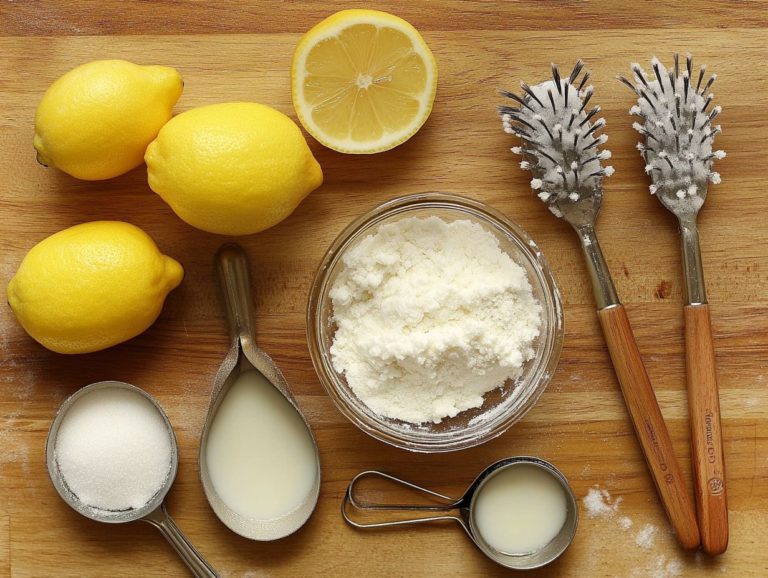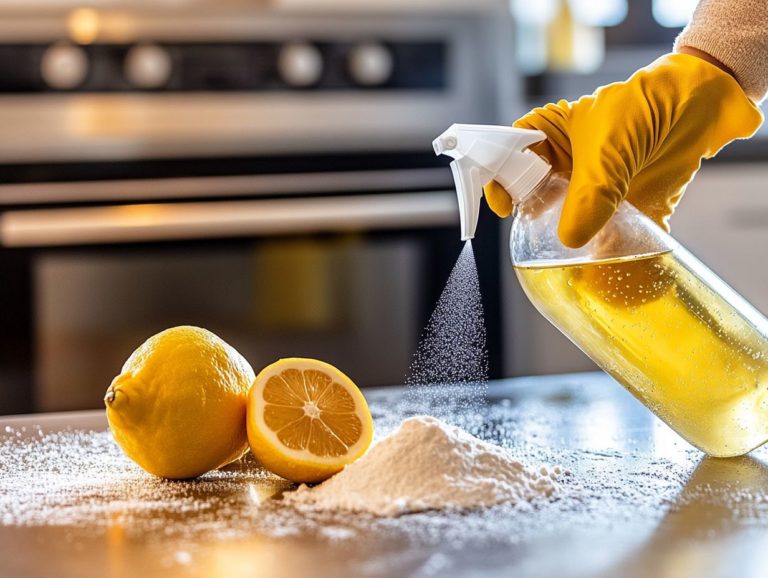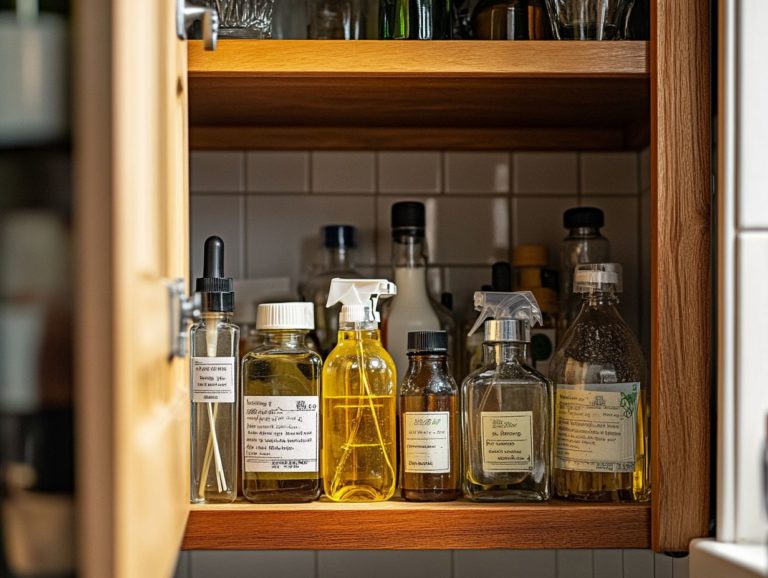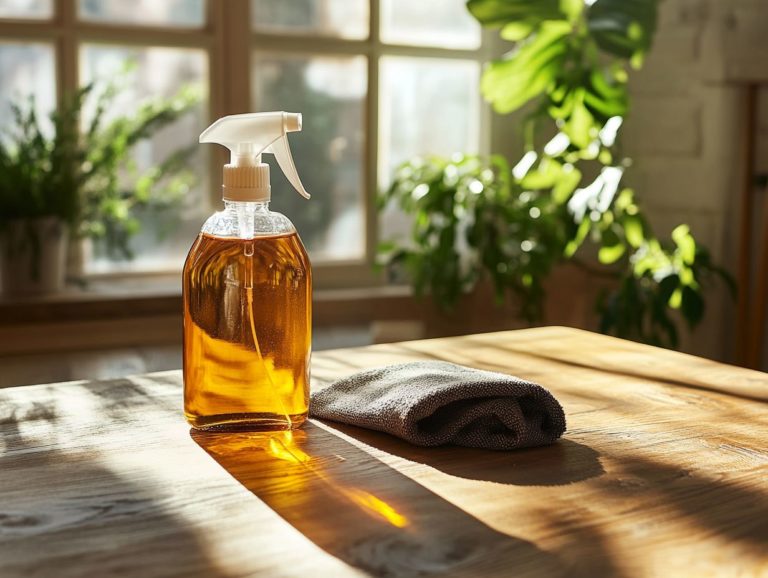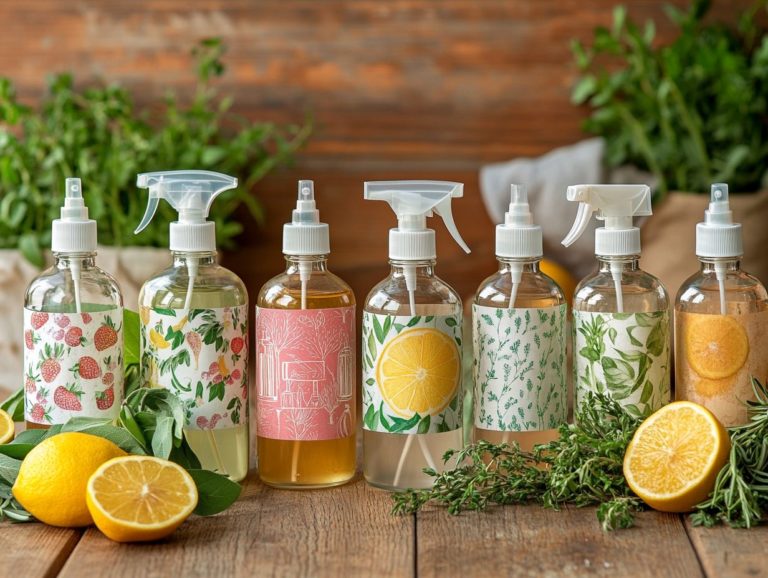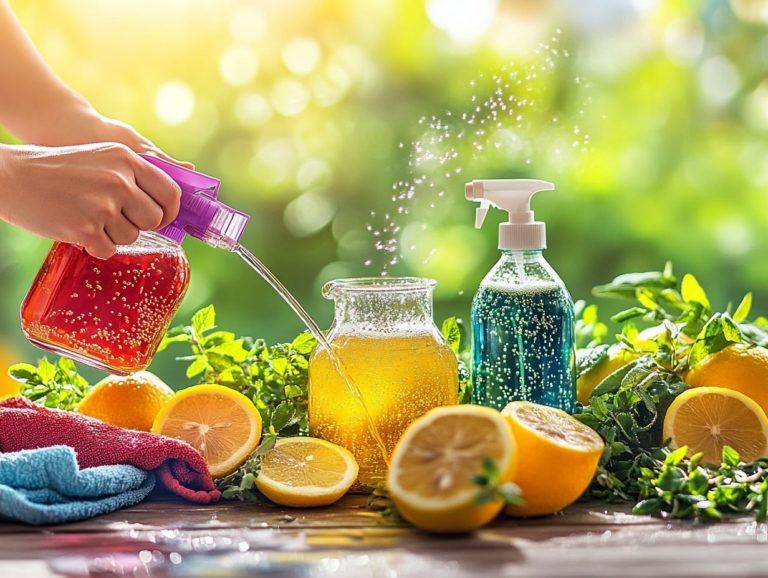5 Homemade Cleaners for Greasy Surfaces
Are you fed up with the relentless struggle against stubborn grease on your surfaces, from kitchen countertops to bathroom tiles, all while trying to keep your budget in check? Your solution is right here.
This article delves into five highly effective homemade cleaning sprays that utilize the remarkable power of natural ingredients to effortlessly combat grease. Whether it’s a simple cleaning vinegar and water mix or a refreshing blend of lemon juice and dish soap, these easy-to-make solutions are not only kind to your wallet but also safe for your family and the environment.
Explore the myriad benefits of DIY cleaning, the versatility of these recipes, and essential tips for safe storage as you embark on the journey toward a cleaner, greener home. From tackling greasy fingerprints on kitchen surfaces to dealing with hard water stains on natural stone, these solutions cover it all.
Contents
- Key Takeaways:
- 1. Vinegar and Water Solution
- 2. Baking Soda and Water Paste: Your Go-To Soft Scrub
- 3. Lemon Juice and Dish Soap Mixture: A Great Glass Cleaner and Air Freshener Spray
- 4. Ammonia and Water Solution
- 5. Cornstarch and Water Paste: The Versatile Natural Stone Cleaner and More
- Why Use Homemade Cleaners Instead of Store-Bought Ones? The Benefits of DIY Cleaners
- What Are the Benefits of Using Natural Ingredients for Cleaning?
- What Surfaces Can These Homemade Cleaners Be Used On?
- How Do These Cleaners Compare to Commercial Cleaners in Terms of Effectiveness?
- What Precautions Should Be Taken When Using Homemade Cleaners?
- How Can These Homemade Cleaners Be Stored for Future Use?
- Frequently Asked Questions
- What are the 5 homemade cleaners for greasy surfaces?
- How do I make a vinegar solution for cleaning greasy surfaces?
- What is the recipe for a baking soda paste for cleaning greasy surfaces?
- Can lemon juice be used as a cleaner for greasy surfaces?
- Is a salt and water solution effective in cleaning greasy surfaces?
- How do I use dish soap as a cleaner for greasy surfaces?
Key Takeaways:
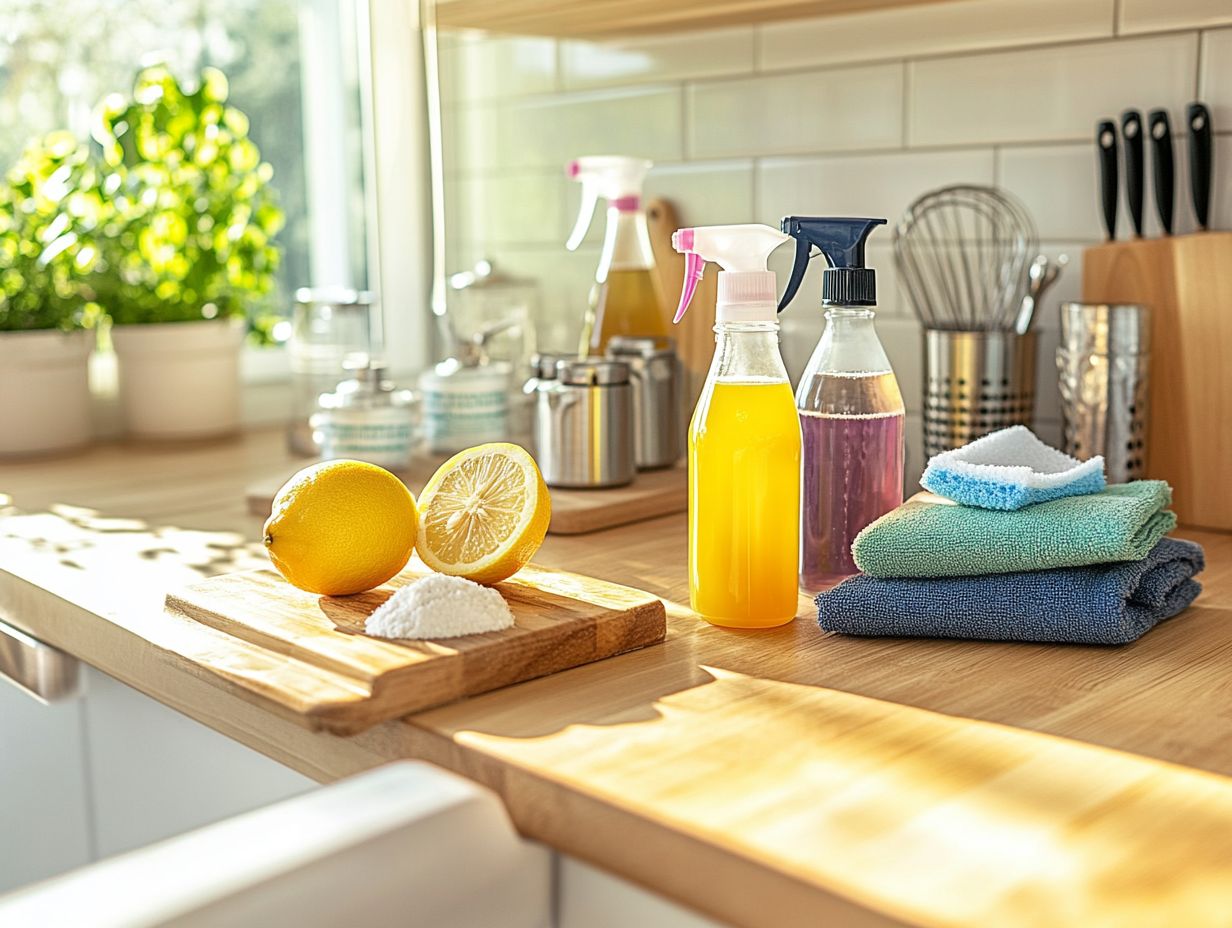
- Easily accessible and affordable ingredients, like white vinegar and baking soda, can be used to create effective homemade cleaning products for greasy surfaces.
- Natural ingredients used in homemade cleaners are not only better for the environment but also safer for your health and can be used on a variety of surfaces, including kitchen countertops and bathroom fixtures.
- Homemade cleaners can be just as effective, if not more, than store-bought cleaners. Plus, they don’t contain harsh chemicals that can be harmful to your health and the environment.
1. Vinegar and Water Solution
A vinegar and water solution serves as a versatile and eco-friendly alternative to chemical-laden cleaning products. It is ideal for anyone looking to create homemade cleaning sprays that are safe for both the environment and your home.
This simple mixture can effectively tackle everything from greasy fingerprints on kitchen surfaces to hard water stains on natural stone, providing an all-purpose cleaner without the harmful chemicals often found in commercial offerings. Try adding isopropyl alcohol for extra cleaning power!
To prepare this cleaning solution, simply mix equal parts of distilled white vinegar and water, achieving a perfect 1:1 ratio for optimal effectiveness. If you d like to elevate the solution, consider adding a few drops of essential oils like tea tree or lemon oil. This not only infuses a delightful fragrance but also enhances its disinfecting properties.
This mixture works well on many surfaces, including countertops, glass, and appliances. To maximize your cleaning power, use microfiber cloths, which are designed to trap dirt and grime more efficiently than traditional materials, ensuring a streak-free shine and a remarkable cleaning experience.
2. Baking Soda and Water Paste: Your Go-To Soft Scrub
A baking soda and water paste is your secret weapon when it comes to cleaning. It acts as an effective soft scrub that effortlessly banishes tough stains and grime from various surfaces, including carpets and natural stone.
This DIY cleaner not only tackles stubborn dirt but also deodorizes and revitalizes your spaces, making it the perfect choice for maintaining a clean and inviting home atmosphere. You can also use it as a carpet stain cleaner by mixing in a bit of dish soap for added effectiveness.
To craft this versatile cleaning paste, mix three parts baking soda with one part water until you achieve a thick consistency. Feel free to adjust this ratio based on the cleaning challenge you’re facing; for heavier grime, a thicker paste is your best bet, while a slightly thinner mix is ideal for general surface cleaning.
This eco-friendly solution can be used on kitchen countertops to combat greasy buildup or on carpets to lift those pesky stains without resorting to the harsh chemicals found in ammonia-based cleaners. Its safe ingredients provide you with peace of mind, especially around pets and children, ensuring a safe cleaning experience that doesn t skimp on effectiveness.
3. Lemon Juice and Dish Soap Mixture: A Great Glass Cleaner and Air Freshener Spray
Combining lemon juice with dish soap creates a powerful mixture that serves as both an effective glass cleaner and a natural air freshener spray. This transforms your home into a fresh and inviting space. The natural acidity of lemon juice cuts through grease and grime effortlessly. Meanwhile, the dish soap tackles stubborn residues, making this DIY cleaner an essential addition to your household arsenal.
Use this mixture in your kitchen and bathroom to keep these high-traffic areas spotless. Want to keep your home fresh? Try this mixture today!
To whip up this versatile solution, simply combine equal parts lemon juice and liquid dish soap in your spray bottle. This blend works wonders on many surfaces. It s especially great for windows and kitchen countertops, where it eliminates streaks and leaves a brilliant shine.
For an added touch, incorporate a few drops of lemon essential oil. This not only enhances the delightful fragrance but also helps kill germs. By choosing this natural blend, you ll create a safer, healthier home environment for you and your family free from the harsh chemicals typically found in store-bought products.
4. Ammonia and Water Solution
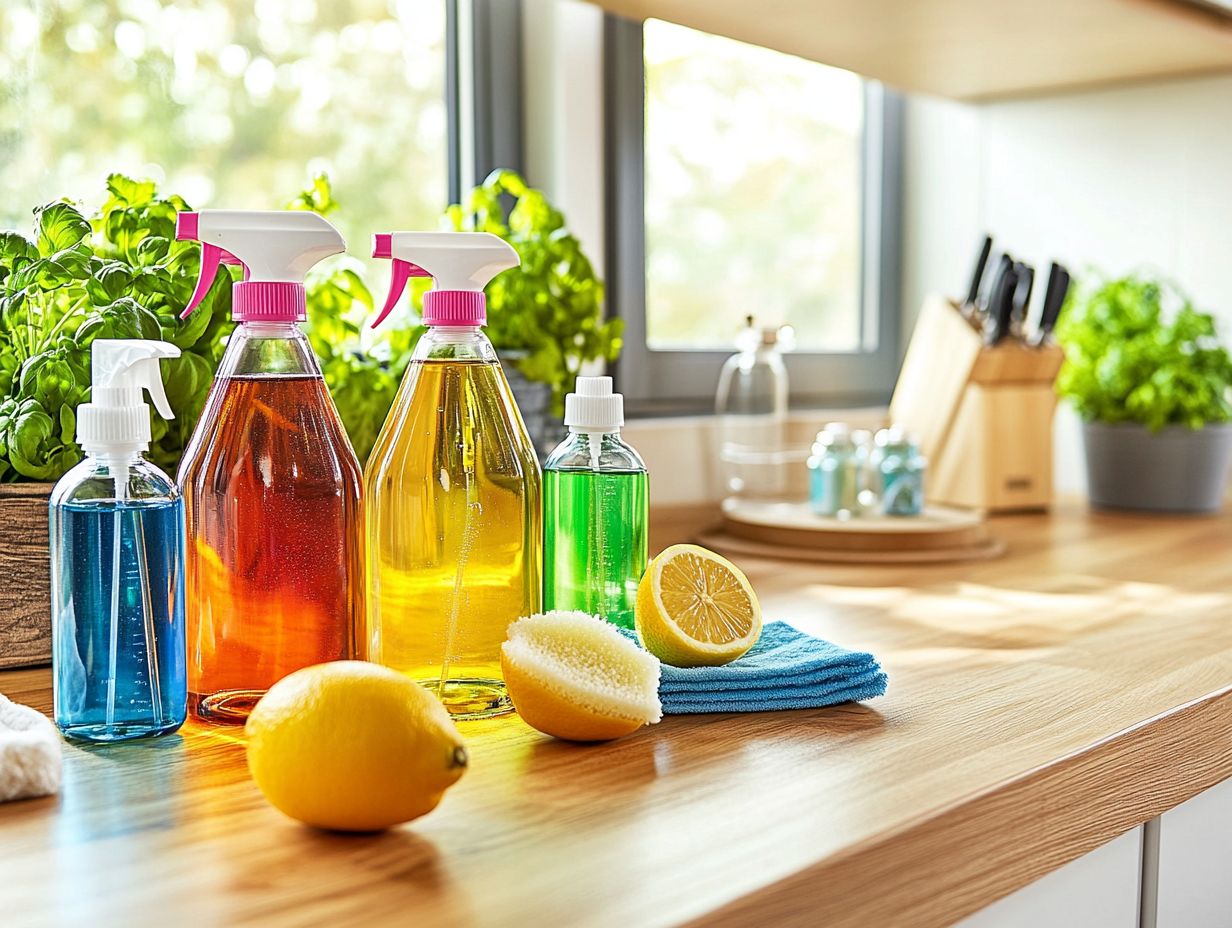
An ammonia and water solution is a remarkable homemade cleaning spray, especially effective for tackling tough cleaning tasks in kitchens and bathrooms, where germs like E. coli and Staphylococcus tend to thrive. This solution cuts through grease effortlessly and disinfects surfaces, making it a favored choice for anyone seeking a robust cleaner without resorting to commercially available ammonia-based products.
To create this cleaning solution, it s crucial to mix one part ammonia with ten parts water. This effective blend preserves disinfecting properties while minimizing potential harm.
Always prioritize safety by working in well-ventilated areas and wearing gloves to protect your skin. It s also wise to test the solution on small, inconspicuous areas first especially on materials like upholstery or painted surfaces that may be sensitive to ammonia.
For those who might be allergic or particularly sensitive to ammonia, rest assured that there are gentler alternatives available, such as vinegar or baking soda-based cleaners. These options can still deliver effective disinfection without the harsh inhalation risks associated with ammonia.
5. Cornstarch and Water Paste: The Versatile Natural Stone Cleaner and More
A cornstarch and water paste offers a remarkable, innovative solution for cleaning a variety of surfaces, from carpets to glass. This DIY cleaner excels at lifting stains and delivering a streak-free shine, making it an invaluable addition to your arsenal of homemade cleaning sprays. It also works effectively as a natural stone cleaner, providing safe and efficient cleaning for your granite countertops.
To whip up this paste, just mix equal parts cornstarch and water until you achieve a smooth consistency. This mixture is effective against a range of stains, including grease, dirt, and even ink. It proves its worth on both glass surfaces and carpets. For an extra boost in cleaning power, consider adding a few drops of essential oils like lemon or lavender. Not only do they enhance the paste’s stain-fighting abilities, but they also infuse a refreshing fragrance into your space.
When dealing with carpet stains, gently blot the area with the paste and allow it to sit for a few minutes before vacuuming. For glass surfaces, simply apply the paste, let it dry, and wipe it off for a crystal-clear shine. This versatile cleaner comes highly recommended by experts like Carolyn Fort from Good Housekeeping and Lauren and Alyssa Gautieri, who have praised its effectiveness.
Why Use Homemade Cleaners Instead of Store-Bought Ones? The Benefits of DIY Cleaners
Choosing homemade cleaners over store-bought alternatives offers numerous benefits. These include cost-effectiveness, safety, and the ability to control the ingredients in your cleaning products.
This choice reduces your exposure to harsh chemicals found in commercial cleaners. It also promotes a more sustainable lifestyle by using natural ingredients such as baking soda, white vinegar, and essential oils.
You can create a wide range of homemade cleaning sprays, allowing you to tailor solutions that effectively address your unique cleaning challenges. For example, a simple mixture of vinegar and lemon juice can effortlessly tackle stubborn grime, while adding essential oils can enhance the fragrance, transforming your cleaning routine into a more enjoyable experience.
Homemade options often perform just as well as store-bought cleaners, especially for everyday messes. This is because they avoid the chemical residues that many people worry about. Customizing these recipes also means you can select scents you adore or ingredients that align with your values.
In doing so, you’re not just cleaning your home; you’re helping reduce chemical waste and promoting a healthier living environment.
What Are the Benefits of Using Natural Ingredients for Cleaning?
Natural ingredients offer many benefits, including safety for both your family and pets, a reduced environmental impact, and the effective elimination of dirt and bacteria all without resorting to harsh chemicals. Popular choices include white vinegar, baking soda, and essential oils, which are not only effective but also versatile in addressing various cleaning tasks from kitchen to bathroom.
Natural cleaning products are incredibly versatile. Take baking soda, for instance: it acts as a gentle scrubber, helping to remove dirt without scratching surfaces while also neutralizing odors, making it an ideal choice for deodorizing carpets and refrigerators. Then there s white vinegar, known for its strong acidity, which makes it excellent for cutting through grease and hard water stains that often plague kitchen surfaces and bathrooms.
Essential oils like tea tree and lavender not only infuse your spaces with delightful scents but also offer antifungal and antibacterial properties, further enhancing your cleaning efforts. When you combine these ingredients, you create a holistic cleaning routine that effectively fosters a healthier home environment.
What Surfaces Can These Homemade Cleaners Be Used On?
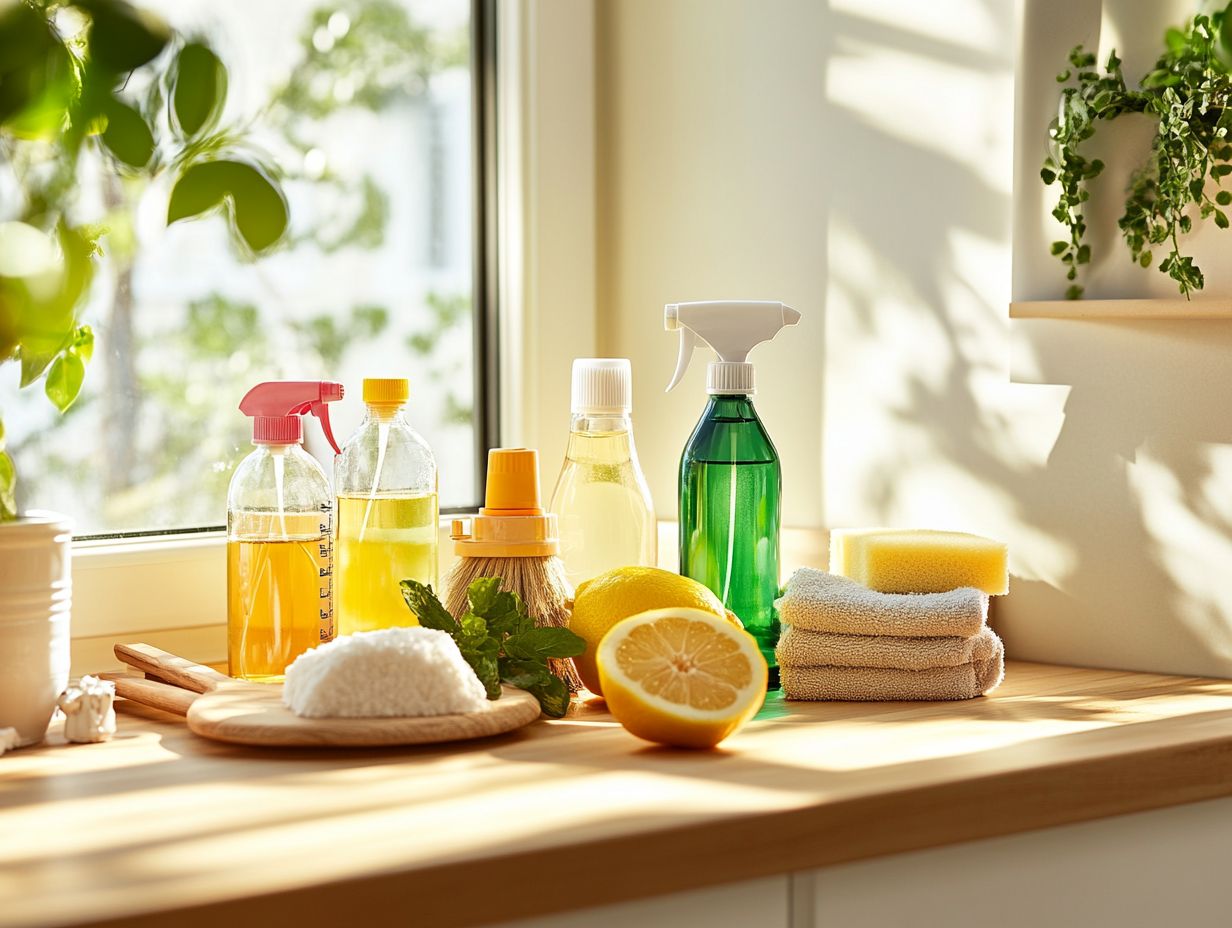
Homemade cleaners can be your secret weapon for effectively tackling a wide range of surfaces throughout your home, from kitchen counters to windows and even natural stone. This versatility allows you to craft cleaning solutions that cater to your specific needs. By selecting the right recipes, you can confidently clean countertops, glass, and floors without the worry of damaging delicate materials. For instance, an all-purpose cleaner can be made using common ingredients like white vinegar and baking soda.
Different surfaces need special cleaning recipes. For example, a vinegar-water solution works wonders as a glass cleaner, leaving you with a streak-free shine, while a baking soda paste effectively tackles tough grime on kitchen appliances. Additionally, using a gentle scrub with baking soda can help remove greasy fingerprints from various surfaces.
However, caution is key when using these cleaners on sensitive surfaces like granite or marble, as acidic ingredients can lead to etching. In such cases, a gentle soap and water mixture is a much safer bet. For granite countertops, consider using a natural stone cleaner. You can also refresh upholstered furniture with a homemade fabric spray, but be sure to test a small area first to avoid any unwanted discoloration.
Transform your cleaning routine today with these easy-to-make homemade solutions! Start your journey towards a cleaner, healthier home now!
How Do These Cleaners Compare to Commercial Cleaners in Terms of Effectiveness?
When you compare homemade cleaners to commercial options, you might discover that natural ingredients like baking soda and white vinegar can be just as effective if not more at tackling common cleaning challenges. They also steer clear of the health risks associated with chemical-laden products. This impressive effectiveness, paired with their non-toxic nature, positions homemade cleaning sprays as a compelling choice for discerning consumers. Homemade air freshener sprays made with essential oils offer a natural alternative to synthetic options.
Take, for instance, a blend of baking soda and vinegar. This dynamic duo works wonders on stubborn kitchen grime and often outshines many heavy-duty commercial degreasers. One user shared that after using this combination on their stove and oven, it emerged sparkling clean and completely free from harmful chemical residues. This DIY cleaner can even effectively remove E. coli and Staphylococcus bacteria.
Research supports the antimicrobial prowess of essential oils like tea tree and lavender, making them excellent for disinfecting surfaces. These natural cleaners also offer customization options. Why not add some citrus zest for a refreshing scent or eucalyptus oil for a boost in antibacterial action? You can create DIY cleaners tailored to specific tasks, such as a natural stone cleaner or a carpet stain remover. This flexibility lets you create custom solutions that meet your unique cleaning needs!
This ability to craft tailored solutions illustrates that nature frequently holds the most effective answers to our everyday challenges.
What Precautions Should Be Taken When Using Homemade Cleaners?
Take important precautions when using homemade cleaners to ensure both their safe and effective use, especially when mixing various ingredients. Understanding which ingredients may interact negatively and maintaining proper storage practices are essential. For instance, avoid mixing vinegar with hydrogen peroxide to prevent forming harmful peracetic acid, which can irritate and potentially harm respiratory systems.
- Do not mix vinegar with hydrogen peroxide.
- Avoid mixing ammonia-based cleaners with bleach as this can produce toxic fumes.
Always store your homemade cleaners in clearly labeled, child-resistant containers to prevent accidental ingestion or misuse. Ideally, keep them out of reach of children and pets. If you have allergies or sensitivities, take the time to research each ingredient carefully. Natural components like essential oils can trigger allergic reactions. Consulting cleaning experts like Lauren and Alyssa Gautieri can provide insights on safe and effective use.
By being aware of these precautions, you’ll maximize both the effectiveness and safety of your homemade cleaning solutions.
Now that you know how to create safe and effective homemade cleaners, why not give it a try? Your home and the planet will thank you!
How Can These Homemade Cleaners Be Stored for Future Use?
Proper storage of your homemade cleaners is essential for maintaining their effectiveness and ensuring safety, especially when you’re using ingredients like rubbing alcohol or essential oils that may degrade over time. Rubbing alcohol should be stored in a cool place away from light to maintain its efficacy.
By adhering to specific storage guidelines and understanding the shelf life of various components, you can guarantee that your DIY cleaning products remain potent and safe for future use.
To begin with, it s best to store your homemade cleaners in opaque glass containers. This choice shields the ingredients from light, which can lead to degradation. Keep these cleaners in a cool, dark spot like a pantry or cabinet to help preserve their potency.
Regularly checking for separation or sediment will allow you to gauge their effectiveness. If you notice any significant changes, it’s wise to discard the product. Using microfiber cloths can enhance the effectiveness of your cleaning solutions.
Clear labeling is another key aspect; always label your containers with what s inside, when you made it, and when it expires. This will help you keep track of your cleaners and use them safely. For example, a DIY all-purpose cleaner may have different storage requirements than a specific glass cleaner or carpet stain cleaner.
By implementing these strategies, you can extend the life of your homemade cleaning solutions while creating a safe environment in your home.
Frequently Asked Questions
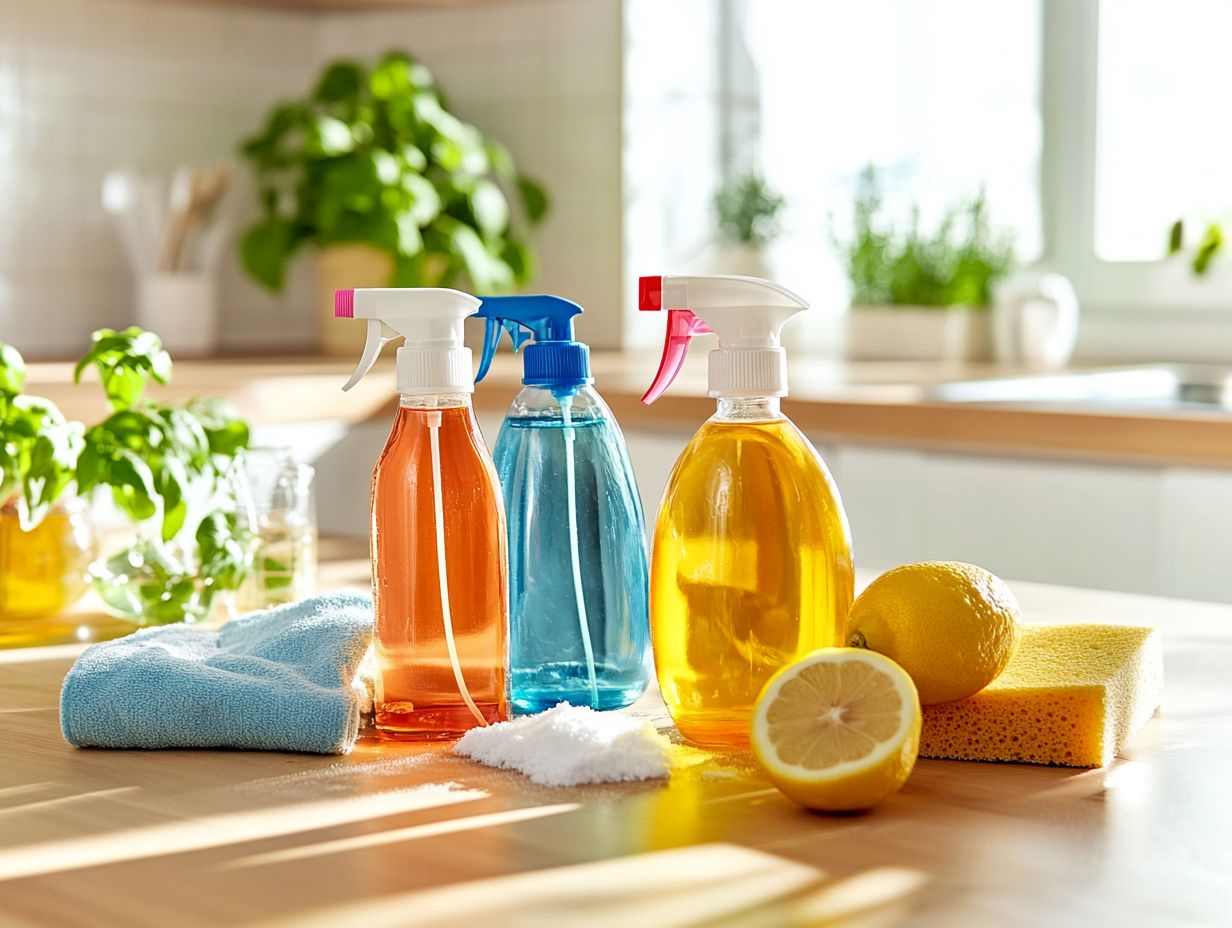
What are the 5 homemade cleaners for greasy surfaces?
The 5 homemade cleaners for greasy surfaces are vinegar solution, baking soda paste, lemon juice solution, salt and water solution, and dish soap solution. You can also try a DIY cleaning vinegar mix for those stubborn greasy spots!
How do I make a vinegar solution for cleaning greasy surfaces?
To make a vinegar solution, mix equal parts of white vinegar and water in a spray bottle. Spray on the greasy surface and wipe clean with a cloth. Adding a few drops of dish soap can enhance its grease-cutting power.
What is the recipe for a baking soda paste for cleaning greasy surfaces?
To make a baking soda paste, mix 1/4 cup of baking soda with enough water to form a thick paste. Apply the paste to the greasy surface and scrub with a sponge or brush. Rinse with water and wipe clean. This paste can also help remove stubborn greasy fingerprints.
Can lemon juice be used as a cleaner for greasy surfaces?
Yes, you can make a lemon juice solution by mixing equal parts of lemon juice and water. This solution can be used to cut through grease and leave surfaces smelling fresh. For added cleaning power, consider using lemon essential oil instead of fresh juice.
Is a salt and water solution effective in cleaning greasy surfaces?
Yes, a salt and water solution can be used to scrub greasy surfaces. Mix 1/4 cup of salt with 1 quart of warm water and use a sponge or brush to scrub away the grease. Rinse with water and wipe clean. This can be particularly effective in cleaning kitchen surfaces.
By following these simple storage tips, you ll keep your homemade cleaners effective and your home safe. Start cleaning smart today!
How do I use dish soap as a cleaner for greasy surfaces?
It s super easy to use dish soap as a cleaner! Just mix a few drops of dish soap with warm water.
Next, grab a sponge or cloth and clean the greasy area. Rinse with water and wipe it clean. You ll be amazed at how effective this method is for greasy kitchen surfaces like stovetops!

